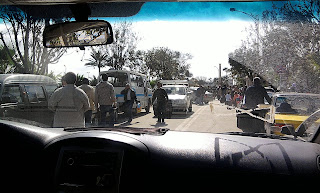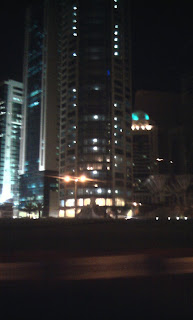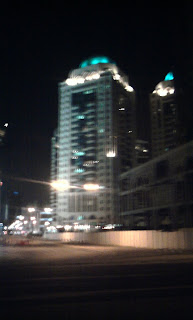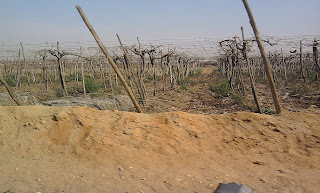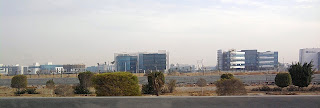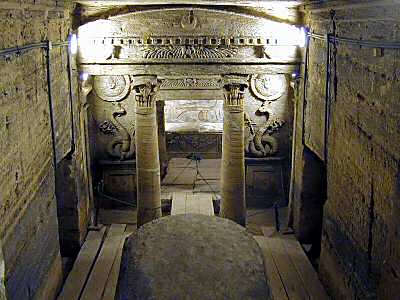We wake shortly before the alarm goes off and start to do our stretches – we are expecting a long day of waiting followed by a long plane trip – 12+ hours.
But our stretches are interrupted by a phone call from Ingrid. It is midnight in Connecticut and it is good to hear her voice, but her news isn't that good. She said Lisa had tried to let us know via e-mail that our flight was cancelled.
Ingrid had tracked down the hotel from the name we had mentioned to Lisa because she realized we would not have received that message, having heard on the news that the Internet was still shut off. We are glad we had not left for Cairo Airport, only to arrive to find we had no flight.
We cannot say that we are terribly surprised by the news, but now need a plan C. Ingrid says a friend of hers who has a sister living in Cairo says we should try instead to fly out of Alexandria. Sergei (who came to the U.S as a refugee from the counterrevolution in Russia in 1990) seconds that. Get out as soon as possible, to anywhere possible. We give Ingrid our passport numbers, thinking it would be good for her to have that, and tell her we will let her know just as soon as we know what we are doing.
We try to call the American Embassy but are simply told to stay put – they do not even want to know our names or where we are.
We go upstairs for breakfast and wait for Dalia to arrive . Outside things look quiet (with tanks).
The Army is clearly here but aside from traffic control, they do not seem to be impeding the movements of civilians in any way. Mubarak made a speech last night, sacking the government but staying in office himself. It is the first time he has addressed the people since the protests began. Too little, too late.
At 7:15 Dalia comes to the restaurant and after getting her some tea for her poor creaky voice, we tell her what is happening. She says she will make some calls, and see what flights might be available from Alexandria.
How was Dalia’s night, we ask. She admits she is a bit shaken. On her way to her friend’s house yesterday evening she saw a security cop beating up an older woman. She intervened and it helped – they let the woman go. Dalia is assertive when she needs to be. She has a hobby of being a kick boxer – not exactly what you imagine when you meet a woman who wears a head covering! However, she had gotten a cold a couple of days ago, and yesterday she had pretty much lost her voice. We have this image of her in mind getting in this cop’s face and having her voice fail to convey her outrage. We think she was shaken up by thinking about the risk she took, but we are sure she would do it again too. She also tells us that she stood a three-hour shift last night with other volunteers (she was armed with only a kitchen knife) guarding the neighborhood where she was staying.
She is also concerned because she has not heard from Samir. He went out to the demonstration and has not been heard from since. Dalia had called Samir’s wife, but she had not heard from him either. Of course, the cell service was still not working, so everyone was hoping that was the reason for Samir's silence. Dalia told his wife that if she and the children felt unsafe, she should go to the home of Dalia’s mother.
We worry about Samir -he is a tall man with a confident, "leader" bearing, and we can imagine him being singled out by riot police.
We agree on a course of action. Dalia will try to find us a flight out of Alexandria and we will go through American Express and try as well.
We return to our room, Using the hotel's land line, we are able to call American Express concierege and explain our situation. The choices are limited, but in less than half an hour we get a confirmed flight for tomorrow evening, January 30th – via Qatar Airlines, to Doha, Qatar, and then direct from Doha to JFK. The only seats on that flight are business class - $2,000 each and worth every penny, Jim figures. This call was also interrupted by a limit on the length of phone calls (15 minutes), and fortunately American Express called us back to complete making the reservation.
It turned out that Dalia was unable to find any flight, and when we call to tell her that we do have a Plan C. she says, “Thank God.” Getting to the Alexandria airport will be much easier and more likely to be successful. American Express is great in this situation.
Our attitude is we never had any intention of going to the Gulf, or flying Qatar Airways, but it will do. To illustrate how chaotic this was, when Dalia checks with the Alexandria airport and Qatar Airways says they have no such flight, so we check to be sure of the airport – there are two from the city. Finally by using our confirmation number, she is able to confirm the flight from the Alexandria Airport. We make plans to leave the hotel at 3:30 tomorrow afternoon.
We resume watching BBC, which is reporting things are still hot in Cairo. At 11 am, we hear demonstrators here again, then we hear armored vehicles. They sound heavier and they turn out to be tanks.
Meanwhile still no word from Samir. Dalia said she has called his wife, but she was in tears, worried about him. Then around noon, the cell service resumes in a spotty manner. We are able to text the kids, intermittently. Still no Internet and have to keep manually shifting between carriers for texting. First one system works and then the other. Dalia calls to tell us the mobile phone service is working now.
Shortly thereafter we get a phone call from Samir. He is OK. Last night he said he was working with others until about 4 am guarding the Cairo Museum from hooligans who had broken in. Not protesters, he says. Maybe plain clothes police, maybe just petty criminals. Anyway he and others roust them from the building, frisk them and recover some things they have attempted to steal and then cordoned off the museum until the Army arrived to take over the job of protection. He sounds very happy that the Army is there. Stay safe, we tell him. He says he must go out again tonight .There are hooligans and others who would take advantage of the situation and he needs to join others to keep the protest on track – peaceful and purposeful. He says “we need to outnumber the criminals.” Wow!
We go up to the rooftop restaurant for lunch and watch the crowds swelling along the Corniche.
We hear repeated chanting coming and going. But we don’t hear the concussion of tear gas any more. To our amazement, relations between the Army and the demonstrators seem courteous, even cordial and we see demonstrators greeting soldiers with some show of enthusiasm.
Except for our time in the restaurant, for meals and tea, we stay in our room, keep our heads down and watch the news on television. The lobby of the hotel is dark, the drapes are shut, the doors are chained. The demonstrations just get louder and larger as the day progresses.
Protesters are marching below us. After prayers end (Coptic and Muslim, both) the crowds swell even more. Peaceful, even jovial. There are thousands of people on the streets, men and women, young and old, even families with small children.The hotel staff is mostly out on the rooftop balcony, watching with everyone else.
We return to our room to watch more BBC and CNN coverage. They are beginning to get the story right. On TV live in Cairo we are seeing cooperation between the military and the demonstrators. Troops make a containment line, converse with the leaders of the demonstration, and a second containment line forms inside the first, made up of the protestors. A Berlin Wall moment, says one commentator.
A 4 pm curfew is announced, and the Army asked people to stay in. By 4:08 we hear people demonstrating. Boom Boom,. Tear gas? what? A few minutes later two more, a bit more distant but still rattling our window. We are far from the center of city and thus far from the center of action. We have our balcony closed and shuttered, as Dalia instructed.
When we go up for dinner, again we watch the crowds swelling. Individual groups ebb and flow, all chanting slogans, “Mubarak must go” and the like. Completely peaceful. Police are now invisible, their threatening black-clad troops in full riot gear have vanished. The protesters swarm around the Army tanks and APCs, sometimes climbing on them, often cheering the soldiers whom they trust, in stark contrast to the police whom they loathe.
We are glad to see the restraint of the army, though are naively concerned about what happens when Mubarak orders them to fire to enforce curfew. State television reports the Army has issued warnings of “extreme danger” to anyone who violates curfew. That turns out to be the dying state, not the military that issued such a warning.
Later Dalia tells us that today Mubarak DID issue an order to fire, and the military ignored it. Instead the military seems in great sympathy with the protesters. Perhaps this is not universal but certainly the majority.
Random reports from people we speak with: The violence after dark seems to be police (not in uniform), This mostly does not take place during the day. Police have deliberately released criminals from jails to force people to return to their homes to protect their families and property. This may have backfired. Instead more people turn out, setting up neighborhood protection units.
The most disturbing thing is BBC's continuing reports that “Cairo is in flames.” Simply false. The building they repeatedly show burning is the ruling party headquarters. That WAS torched by the protesters and apparently the fire companies were not very interested in extinguishing the flames. It was still burning when we left Egypt on Sunday. There were some efforts to torch the Bureau of Interior Affairs, which houses several thousand bureaucrats who eat away the substance of ordinary Egyptians. Also burning are several police stations. We cannot find much fault with the protesters' targets.
Nonetheless we are glad not to be in Cairo. On Mubarak's orders, almost all shops are closed, the Talisman Hotel where we had been staying was only a few blocks from the party headquarters and Tahrir Square, and had no restaurant. Being stuck there for several days would have been miserable, and our chances of getting out of Egypt in a timely manner would have been much poorer. As chaotic as the airport at Alexandria was, Cairo is, from what we later hear from others, many times worse.
We have noticed things are quiet until after dark, when those with sinister purposes mingle with the crowds and attempt to cause disorder. The concussions and more distantly, gunfire, reflect this. By Sunday there had been some 100 deaths reported around the country. Some no doubt just ordinary crime in a country of 86 million. Some may be people taking advantage of the disorder to settle old scores. But some are victims of the protest violence, mostly perpetrated by police and their cronies. We feel deeply humbled to listen to the accounts these people tell – they are true patriots in every sense of the word.
BBC news is showing live pictures of masses of people mixing with tanks and personnel carriers. No rash action by the military . Indeed, pictures of tanks in motion with dozens of protesters riding them, clapping and cheering! There are also pictures of of the Army guarding the Egyptian Museum, bayonets in place.
We go to bed and sleep well. Nothing wakes us.



